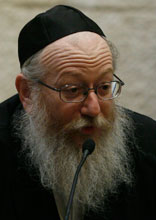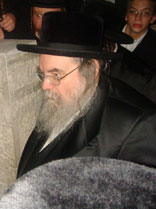In News
Litzman Rules: Brain Death is not Halachic Death
The Deputy Minister of Health has made a ruling regarding the disagreement over the issue of determining when a patient is dead. The doctors are furious. Litzman: This is a halachic matter.
The Israeli health care system is in an uproar, in the wake of an official statement publicized by Deputy Minister of Health, Knesset Member Rabbi Yaakov Litzman, clarifying the position of the Health Ministry regarding the complex and sensitive issue of brain-respiratory death. According to Israeli law, brain death is to be confirmed by two doctors who have been authorized to do so by a public supervision and licensing committee for physicians. And that can only take place after the doctor caring for the patient informs the next of kin that there is a chance that the patient has reached a state of brain-respiratory death, and provides his assessment of the medical situation.
At the same time, that very same law – which the Yahadut HaTorah party strongly opposed, and demanded a revision of certain clauses – states that if confirming that a patient's brain death is in conflict with the patient's ideology or religion, life support that includes artificial respiration will not be discontinued.
The statement released by Deputy Minister Litzman supports the opinion expressed by many great poskim, rabbis, morei hora'ah, and public representatives, who asked for his intervention in order to establish clear guidelines for dealing with brain death in hospitals. Every effort must be made not to confirm the death of a patient if that confirmation is not based on halachically acceptable criteria. A misinterpretation of Israeli law could lead to a person who is still halachically alive to be disconnected from life support machines.
Deputy Minister Rabbi Yaakov Litzman, who has had detailed conversations with Gedolei Yisrael on the matter, decided to present the Jewish, halachic position to the public. Sunday morning, during the opening speech at a symposium on Brain Death chaired by Dr. Chezy Levy, the Health Ministry's director-general for medical services, Litzman's statement was read out loud. Litzman wrote: "I hereby clarify my firm position, based upon Jewish halacha, which states the determining a person's death can only be made after the heart stops beating. As long a person's heart still beats, he is still considered to be alive. All the greatest rabbis hold that any action taken that may cause the heart to stop beating, even after brain death has been confirmed, is unequivocally forbidden."
In his statement, the Deputy Minister of Health Litzman reiterated the ruling presented in the "Chozer Mankal" [policy statement of the Director General] #27/09 of the Ministry of Health, published in June, 2007 – guidelines for implementing the 2008 law of brain-respiratory death. That law specifically states that "If accepting lower-brain death is regarded as forbidden by the patient according to information from the family, the ventilator will not be disconnected and direct life support treatments will not be discontinued - until the patient's heart stops beating. The treatment will be provided at a location determined by professional medical considerations."
Rabbi Litzman's statement prompted many different responses within the health care system, including harsh criticism from some groups. Knesset member Otniel Schneller from Kadima, who first petitioned the law, attacked Litzman, and said that his statement was being used to prevent the law from being implemented.
Supporters of Rabbi Litzman responded by saying, "The law is the law, but it is Deputy Minister Litzman's personal opinion that the law should be applied in full accordance with halacha. The "Chozer Matkal" on the matter clearly permits the family to wait for a patient's heart to stop beating before declaring death. That decision must be fully respected."
Note: Sephardic Chief Rabbi Shlomo Amar and Shas spiritual leader Rabbi Ovadia Yosef have issued halachic rulings recognizing brain death as the end of life, Ha’aretz reported. But their rulings are different than that of Rabbi Yosef Shalom Elyashiv, head of the haredi Ashkenazi faction, who holds that if a patient’s heart is beating he cannot be disconnected from life support.
Rabbi Shmuel Eliyahu, Chief Rabbi of Sfadt, said on the matter in September this year, "Although Rabbi Elyashiv personally holds that heart cessation is what determines death he does not rule out my father's [Mordechai Eliyahu's] position that brain death is death according to Halacha. Therefore, an individual can be allowed to choose between the options."
(R. Waxman contributed the last two paragraphs of this article)







